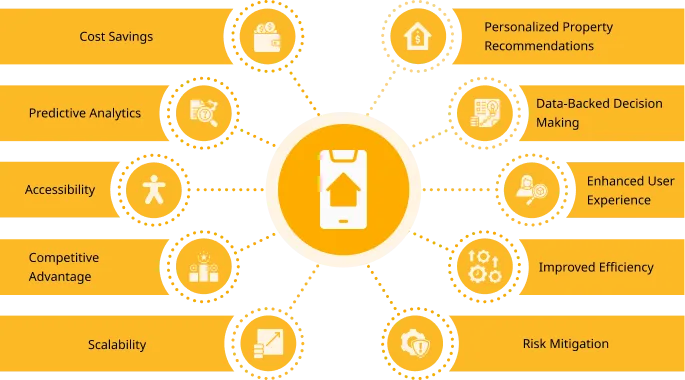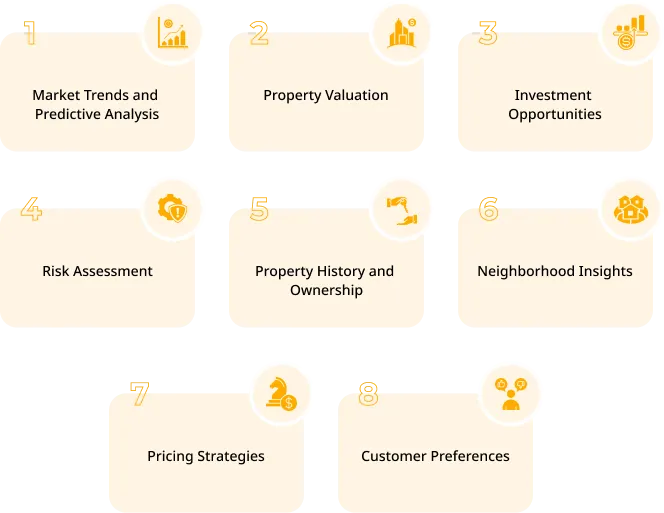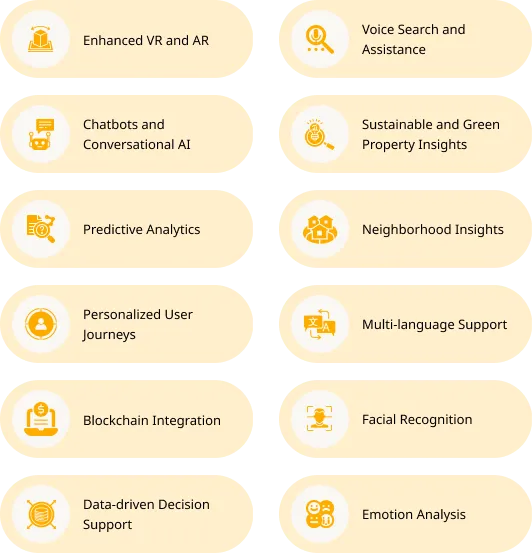Are traditional real estate methods keeping up with the rapidly evolving demands of the modern world?
Imagine being able to predict the perfect home for a buyer before they even search for it or providing investors with AI-driven real estate mobile app strategies and insights that can steer them toward lucrative opportunities. AI-driven analytics can turn your vision into reality.
In an era where smartphones have become the cornerstone of our lives and account for nearly 70% of all online traffic, the real estate industry hasn’t remained untouched by the growth.
But how can an Artificial Intelligence services company transform the mobile app strategies of the real estate sector, enabling it to harness the full potential of this digital landscape? Let’s delve into the world of AI-driven analytics and discover how it’s reshaping the foundations of the real estate mobile app industry.
The Power of AI in Real Estate Mobile Apps
Artificial Intelligence is not just a buzzword in the tech world; it’s a revolutionary force reshaping industries, and real estate is no exception. In real estate mobile apps, AI is not merely a feature but the driving force behind innovation.
AI-driven real estate mobile app strategies leverage data and algorithms to provide users with a personalized and efficient experience. Imagine a mobile app that understands your preferences, predicts your ideal property, and even suggests neighborhoods based on your lifestyle. AI development company makes this possible.
Unlock the future with AI-driven strategies
One of the key strengths of Artificial Intelligence in real estate apps is its ability to process vast amounts of data quickly. It can analyze market trends, historical sales data, and even social media sentiment to give users accurate insights. This means making data-driven decisions for real estate professionals that lead to better investments.
Moreover, AI-powered mobile app development in real estate offers features like virtual property tours, real estate video marketing and 3D modeling. Doing this not only saves time but also widens the scope of possibilities for buyers and renters.
AI also plays a pivotal role in enhancing customer engagement. Chatbots in mobile app development services powered by AI can provide instant responses to user queries, ensuring that potential leads are not lost because of communication delays.
AI isn’t just a technological advancement; it’s the backbone of modern real estate mobile apps, driving efficiency, personalization, and user satisfaction to unprecedented heights.
Benefits of AI-driven Analytics in Real Estate Mobile Apps
AI-driven real estate mobile app strategies are rewriting the rulebook for the industry, and the benefits are profound. Let’s delve into the specific advantages that real estate AI analytics bring to the world of mobile apps:
Personalized Property Recommendations: AI analyzes user preferences, behavior, and past interactions to suggest properties that align with their specific needs and desires. This personalization increases the chances of users finding their dream home or ideal investment property quickly and effortlessly.
Data-Backed Decision Making: AI provides real estate professionals and investors with data-driven insights, such as historical property prices, market trends, and neighborhood data. Armed with this information, they can decide about buying, selling, or investing in real estate, reducing the risks associated with such transactions.
Enhanced User Experience: Virtual property tours and 3D models created with AI technology allow users to explore properties remotely, saving them time and travel expenses. AI-powered chatbots offer immediate responses to user queries, ensuring a smooth and engaging user experience. This interactivity and convenience build trust and satisfaction among users.
Improved Efficiency: AI automates various tasks, such as property valuation, document verification, and lead management. This automation streamlines the buying and selling processes, reducing the time and effort required to complete transactions. Real estate professionals can handle more clients and transactions efficiently.
Also read: Best AI Development Companies To Get Innovative And Tech-Driven Solutions
Risk Mitigation: AI in real estate assesses the risk associated with specific property investments by considering factors like market conditions, location, property condition, and historical data. This risk assessment helps investors make informed decisions, avoid potential pitfalls, and minimize financial losses.
Cost Savings: By reducing manual labor and automating tasks, AI-driven real estate mobile app strategies lead to cost savings for real estate companies. Customers can benefit from these savings by paying reduced fees or more competitive pricing.
Predictive Analytics: AI-powered predictive analytics use historical and real-time data to forecast future property values and market trends. Investors and property buyers can use these insights to make decisions that maximize their returns over time.
Accessibility: AI-driven real estate apps can have accessibility features that make them usable by individuals with disabilities. This inclusivity ensures that a broader range of users can benefit from the technology, fostering equality in accessing real estate information and services.
Competitive Advantage: Real estate companies that embrace AI data-driven mobile app strategies gain a competitive advantage in the market. They can offer innovative features that set them apart from competitors, attracting tech-savvy clients and staying ahead in the rapidly evolving real estate landscape.
Scalability: Artificial intelligence systems can handle large volumes of data and increasing numbers of users without compromising performance. This scalability ensures that real estate mobile apps remain responsive and reliable, even during peak usage periods.
Leverage AI-driven innovation for the future of the property market.
AI-driven analytics in real estate mobile apps empower users, professionals, and companies with valuable insights, efficiency, personalization, and risk mitigation. These benefits enhance the user experience and make real estate transactions more transparent, accessible, and profitable for all stakeholders involved.
AI-driven Insights for Real Estate Mobile Apps
In the ever-evolving world of real estate, information is power, and AI-driven real estate mobile app strategies are unlocking a treasure trove of insights. Let’s delve into how artificial intelligence is changing the game and rewriting the rulebook when gathering and harnessing valuable data.
Market Trends and Predictive Analysis: AI algorithms sift through immense volumes of data, tracking market trends and fluctuations. These insights empower both buyers and sellers with the knowledge needed to make strategic decisions. Whether it’s the best time to list a property or identify neighborhoods on the rise, AI has it covered.
Property Valuation: Accurate property valuation is essential in real estate. AI leverages vast datasets and factors like location, historical sales, and property condition to provide precise valuations. This information helps sellers price their properties competitively and assists buyers in making informed offers.
Investment Opportunities: Investors are always on the lookout for lucrative opportunities. AI-driven real estate mobile app strategies analyze historical data and market conditions to identify potential investment hotspots. Investors can explore untapped areas with confidence, knowing data-driven insights back them.
Risk Assessment: Every real estate transaction carries some degree of risk. AI assesses these risks by considering market stability, property conditions, and local crime rates. Buyers and investors can use this information to mitigate risks and make informed choices.
Property History and Ownership: Unlike typical skip tracing tools, AI can compile comprehensive property histories, including ownership records and any past issues or disputes. This transparency ensures buyers have a complete picture of the property’s background before purchasing.
Neighborhood Insights: Choosing the right neighborhood is crucial. AI-driven analytics provide insights into neighborhood demographics, school ratings, safety records, and more. This information aids homebuyers in finding areas that align with their lifestyle and preferences.
Pricing Strategies: When you hire mobile app developers, they can use AI to suggest optimal pricing strategies based on market conditions, property features, and historical data. This ensures that properties are competitively priced, attracting potential buyers or renters.
Customer Preferences: AI analyzes user behavior and preferences to understand what buyers and renters seek. Real estate mobile apps can provide more accurate property recommendations by identifying patterns that enhance the user experience.
In a data-driven world, AI consulting services data insights are the compass that guides real estate decisions. They offer a level of precision and foresight that was previously unimaginable, making real estate transactions more informed, efficient, and successful.
Harness AI-driven solutions to drive success and foster innovation.
Challenges and Considerations for AI in Real Estate Mobile Apps
While AI-driven real estate mobile app strategies hold immense promise, they also come with a set of challenges and considerations.
Data Privacy and Security: Handling sensitive customer data is a top concern. The security and privacy of user data are crucial to maintaining user trust. Robust encryption and compliance with data protection regulations are vital.
Data Quality and Accuracy: AI heavily relies on data. Ensuring the quality and accuracy of the data used for decision-making is vital. Only accurate data can result in good insights and decisions.
User Adoption and Training: Implementing AI features requires users to adapt to new technologies. Ensuring that users are comfortable with these features and providing adequate training is essential for successful adoption.
Cost of Implementation: Developing and integrating AI-driven features can be costly. Businesses must weigh the benefits against the initial investment and ongoing maintenance costs.
Ethical Considerations: AI can inadvertently reinforce biases present in historical data. Developers must be vigilant in eliminating discrimination to ensure fair and equitable outcomes.
Scalability and Performance: As user bases grow, AI systems must be able to scale efficiently. Ensuring that performance remains optimal even during peak usage is a challenge.
Regulatory Compliance: Real estate professionals must comply with various regulations. AI-driven real estate mobile application development services must adhere to these regulations, which can vary by region.
Integration with Legacy Systems: Many real estate businesses use legacy systems. Integrating AI seamlessly with these systems can be complex and require careful planning.
Continuous Improvement: AI models require ongoing training and improvement. Businesses must allocate resources for constant monitoring and enhancement of AI algorithms.
User Trust and Transparency: Users should understand how AI-driven features work and trust the recommendations they provide. Transparent communication about AI’s role is crucial.
Navigating these challenges and considerations is essential for successfully implementing AI-driven real estate mobile app strategies. Businesses that are proactive in addressing these issues can harness the full potential of AI while providing a secure and user-friendly experience.
Best Practices for Implementing AI in Real Estate Mobile Apps
Implementing AI-driven real estate mobile app strategies requires a thoughtful approach. Here are some best practices to consider:
Define Clear Objectives: Define clear objectives for integrating AI into your mobile app. What problems are you trying to solve, and how will AI help? Having a well-defined purpose is crucial.
Quality Data is Key: AI relies on data. Ensure that your data is accurate, comprehensive, and up-to-date. Invest in data cleansing and validation to improve the quality of the input.
User-Centered Design: Design AI features with the user in mind. Ensure that AI-driven elements enhance the user experience rather than complicate it. Keep the user interface intuitive.
Robust Security Measures: Prioritize data security and user privacy as mobile app development tips in real estate. Implement strong encryption, user authentication, and data access controls to protect sensitive information.
Scalability Planning: Plan for scalability from the outset. As your user base grows, your AI-driven features should be able to handle increased demand without compromising performance.
Ethical AI: Eliminate bias in AI algorithms. Regularly audit and fine-tune your models to ensure fair and unbiased outcomes, particularly in decision-making processes.
Continuous Monitoring: Implement a system for continuously evaluating AI models. This ensures that they remain effective and accurate over time.
Feedback Mechanisms: Create feedback loops for users to provide input on AI recommendations. This helps improve the system and build user trust.
User Education: Educate users about the AI-driven features and how they benefit from them. Transparent communication builds trust and understanding.
Also read: AI App-Titude: How To Find Your App’s Perfect AI Model
Compliance with Regulations: Stay informed about relevant regulations and ensure compliance. This is especially critical in the real estate industry, which is subject to various laws.
Cross-functional Collaboration: Foster cross-platform app development services and collaboration between IT, data scientists, designers, and domain experts. This interdisciplinary approach ensures that AI aligns with business goals.
Testing and Iteration: Test AI-driven features thoroughly before deployment. Collect user feedback and iterate based on real-world usage to refine the user experience.
Regular Updates: Keep AI models and algorithms up to date. Technology evolves, and updating your AI ensures it remains competitive and effective.
Cost-Benefit Analysis: Continuously evaluate the cost versus the benefits of AI implementation. Ensure that the ROI justifies the investment.
Long-Term Vision: Think about the long-term impact of AI on your real estate mobile app. How will it evolve with changing technologies and user needs?
By following these best practices, you can create a robust and user-friendly AI-driven real estate mobile app that meets your users’ needs and positions your business for long-term success in the industry.
AI-powered excellence for smarter real estate solutions
ValueCoders Case Studies: Real-world Examples
At ValueCoders, we believe in turning cutting-edge ideas into transformative realities. Our expert team specializes in crafting AI-driven real estate mobile app strategies that revolutionize the industry. Let’s explore some real-world examples of our innovative solutions:
Property Management Software
Our team developed an intuitive property management software that empowers builders to list, monitor, and seamlessly sell properties. This platform, designed with AI-driven real estate mobile app strategies, optimizes real estate investments, making property transactions hassle-free. By leveraging data analytics and AI, we’ve created a solution that redefines property management in the digital age.
Construction Projects Bidding Platform
We designed a web platform that brings developers, designers, contractors, and subcontractors together to collaborate on construction projects. Our AI-driven approach streamlines communication and project management. Developers can create projects and invite bids, choosing the most suitable offer for construction. This platform enhances efficiency and transparency in the construction industry.
Real Estate Bidding Web Application
Our web application seamlessly connects property buyers and owners on a single platform. Buyers can look for properties based on location, view property details, and make informed decisions. What sets this application apart is its blockchain technology integration to ensure the secure storage of customer information. Each property listed has a unique ID and a growing contract that evolves as it goes up for auction or sale, all powered by AI-driven real estate mobile app strategies.
These case studies represent our commitment to leveraging AI-driven insights and cutting-edge technology to transform the real estate industry. At ValueCoders, we continue to innovate and create solutions that shape real estate’s future through AI.
Future Trends for AI in Real Estate Mobile Apps
The future of AI-driven real estate mobile app strategies is poised to bring about transformative changes in the industry. Here are some exciting trends to watch for:
Enhanced Virtual Reality (VR) and Augmented Reality (AR): Expect to see VR and AR technologies integrated into real estate apps. Users will have immersive property viewing experiences, allowing them to “walk through” homes and neighborhoods from their mobile devices.
Chatbots and Conversational AI: Chatbots will become even more sophisticated, providing instant responses to user queries and facilitating smoother interactions. Conversational AI will handle tasks like scheduling property viewings and answering complex inquiries.
Predictive Analytics: AI will continue to refine predictive analytics, offering more accurate insights into property values and market trends. Investors and homebuyers will benefit from AI-driven predictions for future property performance.
Personalized User Journeys: AI will create highly customized user journeys. Users will receive property recommendations and content tailored to their preferences and past interactions, enhancing engagement and conversions.
Blockchain Integration: Blockchain technology will ensure the security and transparency of property transactions. Smart contracts will automate and validate real estate agreements.
Also read: Streamlining Finance: The Benefits Of AI And ML In Fintech
Data-driven Decision Support: AI will provide real estate professionals with advanced decision support tools. This includes AI-generated reports, market trend analysis, and investment risk assessments.
Voice Search and Assistance: Voice-activated search and virtual assistants will become more prevalent. Users can search for properties and access information through voice commands.
Sustainable and Green Property Insights: AI will assist in identifying sustainable and eco-friendly properties. Buyers and investors can access information about a property’s energy efficiency and environmental impact.
Neighborhood Insights: Real estate apps will offer comprehensive neighborhood insights, including local amenities, safety ratings, and future development plans. This information will help users make more informed location-based decisions.
Multi-language Support: AI-driven language translation and localization will enable real estate apps to serve a global audience, breaking down language barriers.
Facial Recognition: Enhanced security measures may include facial recognition for property access. Buyers and renters can securely view properties without the need for physical keys.
Emotion Analysis: AI can analyze user emotions through interactions and feedback, helping real estate professionals better understand customer sentiment and preferences.
AI-powered innovations await your real estate journey
As AI continues to evolve, these trends will shape the future of real estate mobile apps, making them more intuitive, efficient, and user-centric. By staying abreast of these developments, businesses can harness AI-driven strategies to maintain a competitive edge in the real estate industry.
Conclusion
In the ever-evolving real estate landscape, AI-driven real estate mobile app strategies have emerged as the catalysts of change. They’re not just shaping the future; they’re redefining the present. The possibilities are limitless, from personalized property recommendations to predictive analytics and blockchain-backed transactions.
As the digital realm continues to reshape how we live and work, staying ahead with AI-driven insights becomes more than a choice — it’s necessary. The question is no longer if but how to embrace this transformative force.
So, whether you’re a real estate professional seeking a competitive edge or a buyer on your dream property, the future of real estate mobile apps is AI-driven with lots of potential. Take advantage of what lies ahead; embrace the future today.













